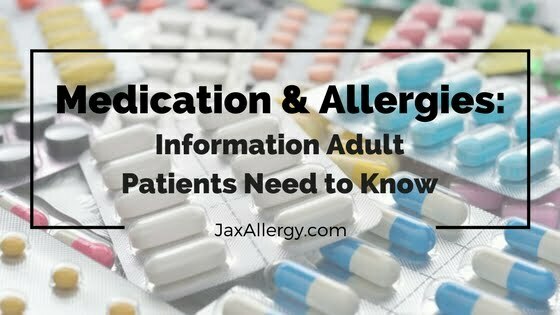Medication and Allergies: Things Every Adult Patient Need to Be Concerned About

It’s common for adults to take several prescriptions to support their health and well-being as they age. But sometimes an individual drug or a combination of them can cause harmful side effects, particularly in adults with allergies and asthma.
It’s important to inform your doctors, including your dentist and ophthalmologist, if you have asthma and allergies. In addition, the side effects of allergy medications may be tolerable for some people while causing greater reactions in other patients. Work with your doctor or your allergist to avoid taking medications which may trigger severe and even fatal reactions.
Learn More About Our Drug & Medication Allergy Treatments
Allergy Medications Adults Should Be Cautious Of
Allergy medications are known for their excellent safety profile. However, high doses of allergy relief medications can cause harmful side effects for those you are sensitive to them or when they are combined with certain medications. Be aware of the side effects of the following two types of allergy medications.
Antihistamines
An allergist may prescribe antihistamines for allergies including allergic conjunctivitis (eye allergy), allergic rhinitis (hay fever), or urticaria (hives).
Antihistamines can cause drowsiness, confusion, blurred vision, and reduced alertness in older adults which can lead to falls and injuries. Other side effects include constipation and urinary retention.
When feasible, the newer second and third generation antihistamines should be used. Unlike first generation antihistamines, these newer antihistamines do not typically cause drowsiness and have fewer overall side effects. Discuss your options with your primary physician or allergy specialist to make sure you’re getting the safest antihistamine.
Decongestants
Pseudoephedrine is a common over-the-counter decongestant sold individually or in combination with an antihistamine. Pseudoephedrine is typically the “-D” or decongestant component in many over the counter allergy medications. Pseudoephedrine is a stimulant and is notorious for causing increased blood pressure, rapid heartbeat, and irregular heartbeat. Those with heart disease or hypertension should be very careful when taking over the counter nasal decongestants.
Medications Capable of Inducing Asthma-like Symptoms
Patients with asthma should be aware of the reactions of these types of drugs, which can trigger symptoms that mimic asthma.
ACE Inhibitors
Ace inhibitors treat hypertension, heart disease and kidney disease. These are usually well tolerated but can trigger a dry, repetitive cough in some people that is often confused for asthma. Interestingly, having a repetitive cough can worsen acid reflux which in turn can increase coughing and worsen asthma symptoms.
Aspirin and Other Non-Steroidal Anti-Inflammatory Drugs (NSAIDS)
Over-the-counter pain relievers such as naproxen, aspirin and ibuprofen can also trigger serious asthma symptoms in some asthmatic patients. This condition is known as ‘NSAID or aspirin associated respiratory disease.’ Those with known sensitivities to NSAIDs and aspirin should avoid these drugs as resulting asthma attacks can be severe and fatal. Aspirin-sensitive patients often tolerate acetaminophen and other prescribed pain relievers.
Beta-Blockers
Beta-blockers are often used for the treatment of migraines, high blood pressure, heart disease and glaucoma. This class of medications can be classified as cardio-selective and non-selective. Non-selective beta-blockers (propranolol) are often avoided in asthmatics due to the potential to provoke bronchoconstriction and jeopardize asthma control. Cardio-selective beta-blockers are thought to be a safer choice for asthmatics given their limited action in the lungs. Be sure to tell all your doctors that you have asthma, including your ophthalmologist, because beta-blockers can be in many types of medications, including eye drops.
At Allergy & Asthma Specialists of North Florida, our board-certified allergists specialize in complete allergy and asthma care for adults and children. Contact us today and schedule an appointment to learn if you’re taking the right allergy medications for your age and health needs.
